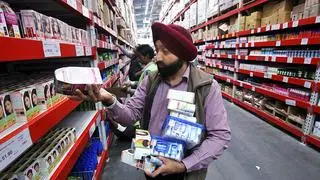The medium and heavy commercial vehicles industry has been a sad story for over many quarters, but the companies now expect some revival in the next few months, especially with the new Government expected to rejuvenate the economic environment.
However, at the moment, the manufacturers say macroeconomic conditions are their main concerns.
“The biggest concern for the commercial vehicles industry is the challenging macroeconomic environment in the country,” Ravi Pisharody, Executive Director, Commercial Vehicles, Tata Motors, told Business Line . The current economic downturn includes concerns around potential food inflation, the falling rupee value, including other key elements such as rising fuel prices, he said. The companies also continue to see stress in the infrastructure, construction and mining sectors, among others, which are important for growing investment. They are hoping for a rational look at taxation across industries, including automotive.
In the recent months, risk aversion and stringent norms in the financial markets have also affected the segment, as many banks stopped giving loans for buying trucks and commercial vehicles.
Therefore, the companies hope that a stable Government with clarity across policies on investment, infrastructure development and taxation would help.
However, they said the real changes are expected at least a quarter later and are expecting better results in the second half of this financial year. “The sentiment is very positive, and while these are early days, we expect that quick decisions on infrastructure development and core sectors will help give the much needed fillip to the economy and our sector,” RN Rao, Director, Sales and Marketing, AMW Motors, said.
The industry is also hoping that the new Government will keep excise duty rates (4 per cent) at the existing level to help the sector come out from a prolonged demand slump.
However, while the companies are mainly looking at sales growth through such means, the transport industry, especially those in the truck business, are a happy lot and are not bothered about buying new trucks.
Transporters happy SP Singh, senior fellow and coordinator, Indian Foundation for Transport Research & Training, said since diesel prices had a fixed increase of 50 paise a month since January 2013, transporters are maintaining the logistics costs.
“Earlier, if there was a sudden hike of ₹2 per litre on diesel, the transporters had to increase its freight charges by around ₹6 to its customers (per km). However, now it is maintained at a certain level,” he said.
Singh said because of this, the trend in the trucking industry is changing and freight owners are using the same trucks for multiple purposes and do not require to buy new ones, as of now. Also, many transporters are buying used trucks, especially in many smaller cities, since there are not many constraints on using older trucks, as in metro cities.
“Instead of buying a new truck for ₹25 lakh, they are buying five trucks at that cost,” Singh said, adding that this was the reason there were not much buyers for trucks and heavy commercial vehicles in smaller towns.
According to latest report by Society of Indian Automobile Manufacturers, domestic sales of total medium and heavy commercial vehicles declined by 17 per cent to 15,429 units in April 2014, as compared to 18,610 units in April 2013.






Comments
Comments have to be in English, and in full sentences. They cannot be abusive or personal. Please abide by our community guidelines for posting your comments.
We have migrated to a new commenting platform. If you are already a registered user of TheHindu Businessline and logged in, you may continue to engage with our articles. If you do not have an account please register and login to post comments. Users can access their older comments by logging into their accounts on Vuukle.